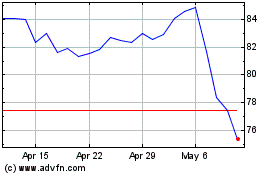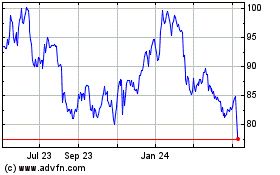A storied but rapidly-shrinking intellectual-property-law
boutique, Kenyon & Kenyon LLP, is moving its practice to
full-service Texas law firm Andrews Kurth LLP, marking the latest
closure from a shrinking national roster of
intellectual-property-law firms.
The deal, to be finalized in the coming days, comes after months
of defections from New York-based Kenyon, which counts companies
including Mattel Inc., Sony Corp. and Volkswagen AG as clients. The
firm employed more than 200 lawyers a decade ago but is down to 55
today in New York, Washington, D.C., and Palo Alto, Calif. All are
joining Andrews Kurth, a 350-lawyer firm that focuses on the
energy, finance and technology sectors.
Founded in 1879, Kenyon is the latest in a string of old-line
intellectual-property-law firms to close over the past several
years. Like Kenyon, many have been absorbed into full-service
firms, largely a reflection of the increasing importance companies
now place on the protection of patents, trademarks and
copyrights.
"We always invented things, but high-tech turns on intellectual
property," said legal consultant Aric Press. Starting around the
late 1990s, he said, "patents became litigated over with no holds
barred and no budgets," turning intellectual property into a
lucrative and coveted practice for larger firms.
Intellectual-property lawyers—both litigators and those who
process patent applications—typically have technical backgrounds,
with many holding advanced degrees in engineering or the sciences.
That has made poaching existing intellectual-property specialists
or scooping up entire boutiques even more attractive to larger
firms trying to get into the practice.
In 2005, for instance, Ropes & Gray LLP acquired
then-prominent intellectual-property firm Fish & Neave. By
then, two other stalwarts in the field, New York's Pennie &
Edmonds and Los Angeles-based Lyon & Lyon LLP, had both gone
bust, with lawyers decamping to other firms. Several smaller
intellectual-property firms have been acquired or dissolved more
recently, including Morgan & Finnegan LLP, whose lawyers joined
Locke Lord LLP in 2009.
Some intellectual-property firms have been able to stay
independent by growing larger themselves, like 370-lawyer Fish
& Richardson, 280-lawyer Knobbe, Martens, Olson & Bear LLP
and Finnegan, Henderson, Farabow, Garrett & Dunner LLP, with
350 professionals.
Steven Nataupsky, managing partner of Orange County,
Calif.-based Knobbe, said he thinks stand-alone
intellectual-property firms can survive by being large enough to
employ experts in a range of technical industries and by keeping a
mix of litigators and those who help companies apply for
patents.
"I think those midsize (intellectual-property) firms, if not
balanced, have really struggled," he said.
Andrews Kurth managing partner Robert Jewell said his firm had
been looking to add intellectual-property lawyers to its current
roster of 33 as part of its focus on technology.
Rather than a merger, the deal is structured in a way that has
become popular lately: hire the lawyers but leave the struggling
firm's liabilities behind. Kenyon managing partner Edward Colbert
said the shell of Kenyon would be wound down.
Mr. Colbert said Kenyon, which has helped protect patents for
inventions ranging from the electric trolley and rechargeable
batteries to windshield wipers and videogame consoles, has
weathered multiple swings in the market but could no longer go it
alone.
He said the firm had been affected by some of the latest hits to
patent work, including 2011's America Invents Act, which created a
new method for adjudicating some patent disputes, and a 2014 U.S.
Supreme Court decision that limited patents on abstract concepts,
including software and business methods.
Mr. Colbert has been public about his firm's uncertain future
for several months. He said Monday that since late last year he has
fielded at least a pitch a week for a combination, and that
conversations with Andrews Kurth began about eight months ago.
Despite recent troubles, Kenyon's work has continued to involve
household names. In October a judge sided with a travel website
represented by Kenyon in a trial over whether the company infringed
on social-media giant Pinterest Inc.'s rights to the term "pin."
The firm has long advised the U.S. Olympic Committee and advised
John Oliver, host of HBO's "Last Week Tonight," in trying to
trademark the term "Drumpf" in relation to Donald Trump's run for
the presidency.
The combination with Andrews Kurth won't completely relegate the
Kenyon name to the history books. In New York, Washington D.C. and
California, and in the branding of the intellectual-property
practice, the firm will now be known as Andrews Kurth Kenyon.
Write to Sara Randazzo at sara.randazzo@wsj.com
(END) Dow Jones Newswires
August 29, 2016 22:35 ET (02:35 GMT)
Copyright (c) 2016 Dow Jones & Company, Inc.
Sony (NYSE:SONY)
Historical Stock Chart
From Mar 2024 to Apr 2024

Sony (NYSE:SONY)
Historical Stock Chart
From Apr 2023 to Apr 2024
